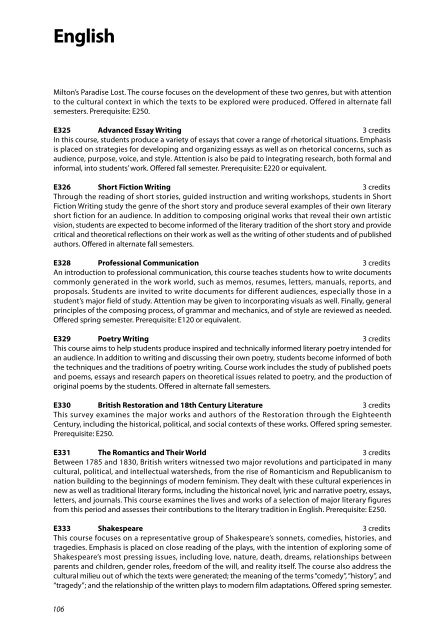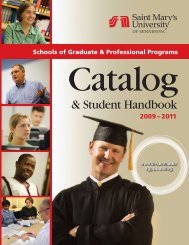PDF version - Saint Mary's University of Minnesota
PDF version - Saint Mary's University of Minnesota
PDF version - Saint Mary's University of Minnesota
Create successful ePaper yourself
Turn your PDF publications into a flip-book with our unique Google optimized e-Paper software.
English<br />
Milton’s Paradise Lost. The course focuses on the development <strong>of</strong> these two genres, but with attention<br />
to the cultural context in which the texts to be explored were produced. Offered in alternate fall<br />
semesters. Prerequisite: E250.<br />
E325 Advanced Essay Writing 3 credits<br />
In this course, students produce a variety <strong>of</strong> essays that cover a range <strong>of</strong> rhetorical situations. Emphasis<br />
is placed on strategies for developing and organizing essays as well as on rhetorical concerns, such as<br />
audience, purpose, voice, and style. Attention is also be paid to integrating research, both formal and<br />
informal, into students’ work. Offered fall semester. Prerequisite: E220 or equivalent.<br />
E326 Short Fiction Writing 3 credits<br />
Through the reading <strong>of</strong> short stories, guided instruction and writing workshops, students in Short<br />
Fiction Writing study the genre <strong>of</strong> the short story and produce several examples <strong>of</strong> their own literary<br />
short fiction for an audience. In addition to composing original works that reveal their own artistic<br />
vision, students are expected to become informed <strong>of</strong> the literary tradition <strong>of</strong> the short story and provide<br />
critical and theoretical reflections on their work as well as the writing <strong>of</strong> other students and <strong>of</strong> published<br />
authors. Offered in alternate fall semesters.<br />
E328 Pr<strong>of</strong>essional Communication 3 credits<br />
An introduction to pr<strong>of</strong>essional communication, this course teaches students how to write documents<br />
commonly generated in the work world, such as memos, resumes, letters, manuals, reports, and<br />
proposals. Students are invited to write documents for different audiences, especially those in a<br />
student’s major field <strong>of</strong> study. Attention may be given to incorporating visuals as well. Finally, general<br />
principles <strong>of</strong> the composing process, <strong>of</strong> grammar and mechanics, and <strong>of</strong> style are reviewed as needed.<br />
Offered spring semester. Prerequisite: E120 or equivalent.<br />
E329 Poetry Writing 3 credits<br />
This course aims to help students produce inspired and technically informed literary poetry intended for<br />
an audience. In addition to writing and discussing their own poetry, students become informed <strong>of</strong> both<br />
the techniques and the traditions <strong>of</strong> poetry writing. Course work includes the study <strong>of</strong> published poets<br />
and poems, essays and research papers on theoretical issues related to poetry, and the production <strong>of</strong><br />
original poems by the students. Offered in alternate fall semesters.<br />
E330 British Restoration and 18th Century Literature 3 credits<br />
This survey examines the major works and authors <strong>of</strong> the Restoration through the Eighteenth<br />
Century, including the historical, political, and social contexts <strong>of</strong> these works. Offered spring semester.<br />
Prerequisite: E250.<br />
E331 The Romantics and Their World 3 credits<br />
Between 1785 and 1830, British writers witnessed two major revolutions and participated in many<br />
cultural, political, and intellectual watersheds, from the rise <strong>of</strong> Romanticism and Republicanism to<br />
nation building to the beginnings <strong>of</strong> modern feminism. They dealt with these cultural experiences in<br />
new as well as traditional literary forms, including the historical novel, lyric and narrative poetry, essays,<br />
letters, and journals. This course examines the lives and works <strong>of</strong> a selection <strong>of</strong> major literary figures<br />
from this period and assesses their contributions to the literary tradition in English. Prerequisite: E250.<br />
E333 Shakespeare 3 credits<br />
This course focuses on a representative group <strong>of</strong> Shakespeare’s sonnets, comedies, histories, and<br />
tragedies. Emphasis is placed on close reading <strong>of</strong> the plays, with the intention <strong>of</strong> exploring some <strong>of</strong><br />
Shakespeare’s most pressing issues, including love, nature, death, dreams, relationships between<br />
parents and children, gender roles, freedom <strong>of</strong> the will, and reality itself. The course also address the<br />
cultural milieu out <strong>of</strong> which the texts were generated; the meaning <strong>of</strong> the terms “comedy”, “history”, and<br />
“tragedy”; and the relationship <strong>of</strong> the written plays to modern film adaptations. Offered spring semester.<br />
106
















